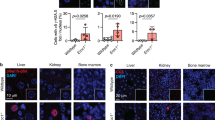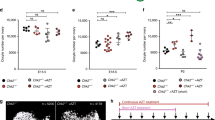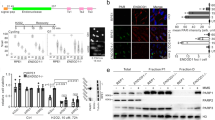Abstract
Genomic instability can trigger cellular responses that include checkpoint activation, senescence and inflammation1,2. Although genomic instability has been extensively studied in cell culture and cancer paradigms, little is known about its effect during embryonic development, a period of rapid cellular proliferation. Here we report that mutations in the heterohexameric minichromosome maintenance complex—the DNA replicative helicase comprising MCM2 to MCM73,4—that cause genomic instability render female mouse embryos markedly more susceptible than males to embryonic lethality. This bias was not attributable to X chromosome-inactivation defects, differential replication licensing or X versus Y chromosome size, but rather to ‘maleness’—XX embryos could be rescued by transgene-mediated sex reversal or testosterone administration. The ability of exogenous or endogenous testosterone to protect embryos was related to its anti-inflammatory properties5. Ibuprofen, a non-steroidal anti-inflammatory drug, rescued female embryos that contained mutations in not only the Mcm genes but also the Fancm gene; similar to MCM mutants, Fancm mutant embryos have increased levels of genomic instability (measured as the number of cells with micronuclei) from compromised replication fork repair6. In addition, deficiency in the anti-inflammatory IL10 receptor was synthetically lethal with the Mcm4Chaos3 helicase mutant. Our experiments indicate that, during development, DNA damage associated with DNA replication induces inflammation that is preferentially lethal to female embryos, because male embryos are protected by high levels of intrinsic testosterone.
This is a preview of subscription content, access via your institution
Access options
Access Nature and 54 other Nature Portfolio journals
Get Nature+, our best-value online-access subscription
$29.99 / 30 days
cancel any time
Subscribe to this journal
Receive 51 print issues and online access
$199.00 per year
only $3.90 per issue
Buy this article
- Purchase on Springer Link
- Instant access to full article PDF
Prices may be subject to local taxes which are calculated during checkout




Similar content being viewed by others
Data availability
All data that underlie the findings of this study are presented in the paper, except for RNA-seq data, which have been deposited in the GEO database under accession number GSE119710. Source data are provided with the paper for the γH2AX and MCM protein quantifications.
References
Rodier, F. et al. Persistent DNA damage signalling triggers senescence-associated inflammatory cytokine secretion. Nat. Cell Biol. 11, 973–979 (2009).
Nyberg, K. A., Michelson, R. J., Putnam, C. W. & Weinert, T. A. Toward maintaining the genome: DNA damage and replication checkpoints. Annu. Rev. Genet. 36, 617–656 (2002).
Chuang, C.-H., Wallace, M. D., Abratte, C., Southard, T. & Schimenti, J. C. Incremental genetic perturbations to MCM2-7 expression and subcellular distribution reveal exquisite sensitivity of mice to DNA replication stress. PLoS Genet. 6, e1001110 (2010).
Shima, N. et al. A viable allele of Mcm4 causes chromosome instability and mammary adenocarcinomas in mice. Nat. Genet. 39, 93–98 (2007).
Bianchi, V. E. The anti-inflammatory effects of testosterone. J. Endocr. Soc. 3, 91–107 (2019).
Luo, Y. et al. Hypersensitivity of primordial germ cells to compromised replication-associated DNA repair involves ATM–p53–p21 signaling. PLoS Genet. 10, e1004471 (2014).
Hills, S. A. & Diffley, J. F. X. DNA replication and oncogene-induced replicative stress. Curr. Biol. 24, R435–R444 (2014).
Zeman, M. K. & Cimprich, K. A. Causes and consequences of replication stress. Nat. Cell Biol. 16, 2–9 (2014).
Kato, K., Omura, H., Ishitani, R. & Nureki, O. Cyclic GMP-AMP as an endogenous second messenger in innate immune signaling by cytosolic DNA. Annu. Rev. Biochem. 86, 541–566 (2017).
Yang, H., Wang, H., Ren, J., Chen, Q. & Chen, Z. J. cGAS is essential for cellular senescence. Proc. Natl Acad. Sci. USA 114, E4612–E4620 (2017).
Ibarra, A., Schwob, E. & Méndez, J. Excess MCM proteins protect human cells from replicative stress by licensing backup origins of replication. Proc. Natl Acad. Sci. USA 105, 8956–8961 (2008).
Woodward, A. M. et al. Excess Mcm2–7 license dormant origins of replication that can be used under conditions of replicative stress. J. Cell Biol. 173, 673–683 (2006).
Ge, X. Q., Jackson, D. A. & Blow, J. J. Dormant origins licensed by excess Mcm2–7 are required for human cells to survive replicative stress. Genes Dev. 21, 3331–3341 (2007).
Kunnev, D. et al. DNA damage response and tumorigenesis in Mcm2-deficient mice. Oncogene 29, 3630–3638 (2010).
Kawabata, T. et al. Stalled fork rescue via dormant replication origins in unchallenged S phase promotes proper chromosome segregation and tumor suppression. Mol. Cell 41, 543–553 (2011).
Gondos, B. in Testicular Development, Structure and Function (eds Steinberger, A. & Steinberger, B.) 3–20 (Raven, NY, 1980).
Litvinov, I. V. et al. Androgen receptor as a licensing factor for DNA replication in androgen-sensitive prostate cancer cells. Proc. Natl Acad. Sci. USA 103, 15085–15090 (2006).
Shi, Y.-K. et al. MCM7 interacts with androgen receptor. Am. J. Pathol. 173, 1758–1767 (2008).
Mackenzie, K. J. et al. cGAS surveillance of micronuclei links genome instability to innate immunity. Nature 548, 461–465 (2017).
Liva, S. M. & Voskuhl, R. R. Testosterone acts directly on CD4+ T lymphocytes to increase IL-10 production. J. Immunol. 167, 2060–2067 (2001).
Malkin, C. J. et al. The effect of testosterone replacement on endogenous inflammatory cytokines and lipid profiles in hypogonadal men. J. Clin. Endocrinol. Metab. 89, 3313–3318 (2004).
Grosse, A., Bartsch, S. & Baniahmad, A. Androgen receptor-mediated gene repression. Mol. Cell. Endocrinol. 352, 46–56 (2012).
Palayoor, S. T. et al. Gene expression profile of coronary artery cells treated with nonsteroidal anti-inflammatory drugs reveals off-target effects. J. Cardiovasc. Pharmacol. 59, 487–499 (2012).
MacKenzie, K. F. et al. MSK1 and MSK2 inhibit lipopolysaccharide-induced prostaglandin production via an interleukin-10 feedback loop. Mol. Cell. Biol. 33, 1456–1467 (2013).
Ahn, J., Son, S., Oliveira, S. C. & Barber, G. N. STING-dependent signaling underlies IL-10 controlled inflammatory colitis. Cell Reports 21, 3873–3884 (2017).
Cadet, P., Rady, P. L., Tyring, S. K., Yandell, R. B. & Hughes, T. K. Interleukin-10 messenger ribonucleic acid in human placenta: implications of a role for interleukin-10 in fetal allograft protection. Am. J. Obstet. Gynecol. 173, 25–29 (1995).
Bai, G., Smolka, M. B. & Schimenti, J. C. Chronic DNA replication stress reduces replicative lifespan of cells by TRP53-dependent, microRNA-assisted MCM2–7 downregulation. PLoS Genet. 12, e1005787 (2016).
Chuang, C.-H. et al. Post-transcriptional homeostasis and regulation of MCM2–7 in mammalian cells. Nucleic Acids Res. 40, 4914–4924 (2012).
Suarez-Carmona, M., Lesage, J., Cataldo, D. & Gilles, C. EMT and inflammation: inseparable actors of cancer progression. Mol. Oncol. 11, 805–823 (2017).
Bakker, S. T. et al. Fancm-deficient mice reveal unique features of Fanconi anemia complementation group M. Hum. Mol. Genet. 18, 3484–3495 (2009).
Wolf, C. J., Hotchkiss, A., Ostby, J. S., LeBlanc, G. A. & Gray, L. E. Jr. Effects of prenatal testosterone propionate on the sexual development of male and female rats: a dose-response study. Toxicol. Sci. 65, 71–86 (2002).
Eicher, E. M., et al. Sex reversal in C57BL/6J-YPOS mice corrected by a Sry transgene. Phil. Trans. R. Soc. Lond. B 350, 263–269 (1995).
Truett, G. E. et al. Preparation of PCR-quality mouse genomic DNA with hot sodium hydroxide and tris (HotSHOT). Biotechniques 29, 52–54 (2000).
Varshney, G. K. et al. High-throughput gene targeting and phenotyping in zebrafish using CRISPR/Cas9. Genome Res. 25, 1030–1042 (2015).
Singh, P., Schimenti, J. C. & Bolcun-Filas, E. A mouse geneticist’s practical guide to CRISPR applications. Genetics 199, 1–15 (2015).
Hadjantonakis, A. K., Cox, L. L., Tam, P. P. & Nagy, A. An X-linked GFP transgene reveals unexpected paternal X-chromosome activity in trophoblastic giant cells of the mouse placenta. Genesis 29, 133–140 (2001).
Trapnell, C. et al. Transcript assembly and quantification by RNA-seq reveals unannotated transcripts and isoform switching during cell differentiation. Nat. Biotechnol. 28, 511–515 (2010).
Subramanian, A. et al. Gene set enrichment analysis: a knowledge-based approach for interpreting genome-wide expression profiles. Proc. Natl Acad. Sci. USA 102, 15545–15550 (2005).
Rinaldi, V. D., Bloom, J. C. & Schimenti, J. C. Whole mount immunofluorescence and follicle quantification of cultured mouse ovaries. J. Vis. Exp. 135, e57593 (2018).
Schindelin, J. et al. Fiji: an open-source platform for biological-image analysis. Nat. Methods 9, 676–682 (2012).
Acknowledgements
We thank the Cornell Transgenic Core facility for help in producing the Fancm mutant mice, and J. Grenier from the RNA Sequencing Core. This work was supported by grants from NIH (R01 HD086609 and T32 HD057854 to J.C.S., the latter grant supporting M.D.W. and J.C.B.) and the Department of Defense (BC083376 to C.-H.C.).
Reviewer information
Nature thanks Björn Schumacher and the other anonymous reviewer(s) for their contribution to the peer review of this work.
Author information
Authors and Affiliations
Contributions
C-H.C. made the original observations of sex skewing and performed studies with testosterone and the Sry transgene while at Cornell University. A.J.M. discovered the link to inflammation and the effect of maternal genotype, and performed all experiments related to these; he also helped write and assemble the manuscript. M.D.W. performed the X chromosome-inactivation study. J.C.B. developed the Fancm mice and analysed sex ratios. J.C.S. supervised all aspects of the work and wrote the manuscript.
Corresponding author
Ethics declarations
Competing interests
The authors declare no competing interests.
Additional information
Publisher’s note: Springer Nature remains neutral with regard to jurisdictional claims in published maps and institutional affiliations.
Extended data figures and tables
Extended Data Fig. 1 X chromosome inactivation is not perturbed in MCM-mutant embryos.
Mouse female embryos bearing one X-chromosome-linked GFP transgene were dispersed into single cells, and examined by flow cytometry for GFP fluorescence. Control mice were female littermates with a genotype of Mcm4C3/+Mcm2+/+ or Mcm4C3/C3Mcm2+/+. The centre line represents the mean, and error bars represent the s.d. in GFP+ cells among the individual embryos (n) used. There was no significance difference (n.s) between the values by an unpaired two-tailed t-test (P = 0.926). C3/C3, Mcm4C3/C3; M2/+, Mcm2Gt/+.
Extended Data Fig. 2 Placental, but not embryonic, levels of MCM are decreased in MCM mutants independent of maternal genotype, and NSAID does not rescue levels of MCM.
a, Representative western blots of protein lysates from E13.5 embryos and placentae of the indicated genotypes (top of each lane), immunolabelled with antibodies against MCM2, MCM4 and β-actin. The samples came from dams of two genotypes (indicated at the top of the panel). C3/C3, Mcm4C3/C3; C3/+, Mcm4C3/+; M2/+, Mcm2Gt/+. Note that the levels of MCM4 are particularly affected. The experiment was performed twice for each maternal genotype. For gel source data, see Supplementary Fig. 1. b, Placental levels of MCM2 and MCM4 proteins from the indicated maternal genotypes were quantified from western blots (including blots additional to those shown in a), which were imaged (see Methods) and normalized to actin and protein levels in the wild type. Each plotted point represents a single placenta. P values are from an unpaired, two-tailed t-test. Placentae corresponding to male or female Mcm4C3/C3Mcm2Gt/+ genotypes are indicated. Centre lines represent the mean, and error bars indicate s.d. c, Embryonic levels of MCM2 and MCM4 proteins were determined as in b. Each plotted point represents a single embryo. Embryos corresponding to male or female Mcm4C3/C3Mcm2Gt/+ genotypes are indicated. The results were not significant by a one-way analysis of variance (ANOVA).
Extended Data Fig. 3 Sex-specific altered expression of inflammation genes in mutants.
a, Heat map of the ratio of FPKM values for key genes from top-ranking genes from the following three gene set enrichment analysis hallmarks: EMT, allograft rejection and interferon-γ response. The ratios are expressed as female:male for each of the indicated embryo and dam genotypes. Data are from RNA-seq on n = 16 placentae; n = 6 Mcm4C3/C3Mcm2Gt/+ placentae of embryos from Mcm4C3/C3 dams, n = 6 Mcm4C3/C3Mcm2Gt/+ placentae of embryos from Mcm4C3/+Mcm2Gt/+ dams and n = 4 placentae of embryos from homozygous Mcm4C3/C3 matings. Equal numbers of male and female mice were used. C3/C3, Mcm4C3/C3; C3/+, Mcm4C3/+; M2, Mcm2Gt/+. b, Maternal genotype affects the expression of inflammation genes. The ratios of female:male FPKM values of Mcm4C3/C3Mcm2Gt/+ embryos for Mcm4C3/C3 dams are plotted, compared to Mcm4C3/+Mcm2Gt/+ dams for the same gene sets as in a. The highest and lowest ranked genes are all related to inflammation responses.
Supplementary information
Supplementary Information
This file contains uncropped scans with size marker indications.
Supplementary Tables
This file contains Supplementary Tables S1-S10.
Supplementary Information
This file contains a Supplementary Tables Guide for Tables S1-S10.
Rights and permissions
About this article
Cite this article
McNairn, A.J., Chuang, CH., Bloom, J.C. et al. Female-biased embryonic death from inflammation induced by genomic instability. Nature 567, 105–108 (2019). https://doi.org/10.1038/s41586-019-0936-6
Received:
Accepted:
Published:
Issue Date:
DOI: https://doi.org/10.1038/s41586-019-0936-6
This article is cited by
-
Transcriptome analysis of adenomyosis eutopic endometrium reveals molecular mechanisms involved in adenomyosis-related implantation failure and pregnancy disorders
Reproductive Biology and Endocrinology (2024)
-
DHX9 maintains epithelial homeostasis by restraining R-loop-mediated genomic instability in intestinal stem cells
Nature Communications (2024)
-
The effect of letrozole overlapped with gonadotropin on IVF outcomes in women with DOR or aged over 40 years old with repeated cycles
Journal of Ovarian Research (2023)
-
Nuclear respiratory factor 1 transcriptomic signatures as prognostic indicators of recurring aggressive mesenchymal glioblastoma and resistance to therapy in White American females
Journal of Cancer Research and Clinical Oncology (2022)
-
The landscape of aging
Science China Life Sciences (2022)
Comments
By submitting a comment you agree to abide by our Terms and Community Guidelines. If you find something abusive or that does not comply with our terms or guidelines please flag it as inappropriate.



